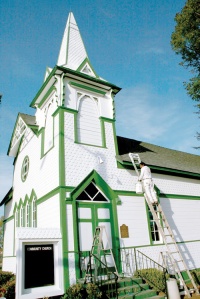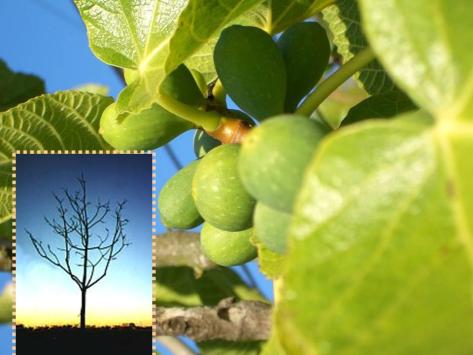Third Sunday of Lent: It’s Metanoia Time
One day a pastor of a small church in the country decided to paint his church. Being very frugal, he calculated carefully to spend the absolute minimum on paint. Unfortunately, when he was only halfway finished, he started to realize that he did not have enough paint to complete the job. Not wishing to spend any more money he decided to dilute the remainder of his paint with paint thinner to stretch it out longer. It turned out that he had to repeat this process several times before he finished. Just when the pastor finished the last brushstroke on the side of the church, all of a sudden, the sky darkened, and it started to rain hard.
 As the pastor watched the paint stream down the side of his freshly painted church he cried out in desperation, “Oh Lord! All my hard work has been wasted. What am I to do?”
As the pastor watched the paint stream down the side of his freshly painted church he cried out in desperation, “Oh Lord! All my hard work has been wasted. What am I to do?”
Just then, a fearsome voice thundered from heaven above: “Repaint, you thinner! And thin no more!”
Metanoia: conversion of heart and repentance
Jesus’s words in the Gospel, “Do you think those Galileans were worse sinners than you?” can be hard for us to understand, nowadays. We don’t look at other people’s misfortunes any more and think, “Boy, God really had it out for them!” Fortunately, our mentality has changed a lot (and for the better) since ancient times.
This shift in mentality does not mean, however, that we cannot relate to today’s Gospel. To make the shift that will allow us to relate to Jesus’ words, we shouldn’t put ourselves into the Galilean’s shoes, rather, we need to put the Galilean in our shoes.
In other words, bring the gospel into your personal circumstances today. (Which is precisely what Jesus was asking his listeners to do back then).
Today, Jesus asks for METANOIAAAAA — Thunder-Boom-Crash! — that’s conversion of heart and repentance, the real stuff Lent is made of.
Metanoia is a shift in mindset and in heart. In today’s Gospel we learn how to make that shift.

METANOIA AHEAD
First, in the Gospel, Jesus does not ask us to compare ourselves to Galileans. Rather, he asks us not to compare ourselves to Galileans. In other words, don’t compare yourself to others – Do Not Judge Others. For a true and sincere conversion of heart, the first thing we need to do is to take a deep, long look at ourselves.
To help us make the shift, Jesus invites us to compare ourselves to a fig tree, instead of other people. Odd, indeed.
By relating to our own lives in terms of the fig tree in this parable, the real lesson should set in: If we truly repent, we will see the fruits of repentance in our lives.
“Where is the fruit?” That’s what we should be asking ourselves today, in this third Sunday of mid-Lent.

Before and After (you decide)
If we do not see the fruits of metanoia when we examine our hearts, we need to ask deeper questions about what we need to change in order to see those fruits, and then ask for the courage to make that change.
The gardener in today’s parable reminds us of the need to return to the fundamentals of Lent. In order to get the fig tree in proper shape to bear fruit, the gardener realizes that he must undertake the hard work of renewal.
Similarly, the Church recommends that we undertake the hard work of renewal during Lent through sacrifice, prayer, and almsgiving.
- Cultivate the ground of your soul through charity (e.g., almsgiving)
- Fertilize your soul through prayer
- Prune your soul of unnecessary attachments through sacrifice and fasting
Then, when we have offered the Lord our best by collaborating with his grace in our soul, then God will deliver the fruits of repentance and renewal that we seek during Lent.
So if at this point during your lenten journey, you see the paint running off the walls of your freshly painted church you worked so hard to paint, there’s still time to repaint — there’s still a month till Easter.
(Get Ready!)
Pingback: Do You Think Those Men Were Greater Sinners Than You? Fuggedaboutit! | CATHOLIC FEAST
“collaborating with his grace” = good line
Fundamentally, grace is that without which there can be no fruit. Yet the Lord wants it to come through us with our collaboration. Our God is a gracious God!
“Time to repaint.” I like that! God Bless, SR
You know what? I did not even catch that last pun until now! Doh!
Thanks, SR!
Just told that joke to my wife…
TOO funny.
😀
Good message; great post, James, …….including the unintentional pun!
Thanks JTR. I still can’t get over the fact that I wrote that and didn’t catch the pun, especially since I started with that joke — the mind is a weird, weird thing sometimes.
You know you have a great post when every reader finds their own little personal, meaningful “gem” within it. I was struck by the admonition not to compare ourselves to others. With my background and considerable lack of self-esteem, this was a negative thing, this comparing. But to equate it in my situation with judging others–that was an interesting paradox to consider. Anyway, there was food for much reflection there, and thank you for that! We do indeed need to look deep inside and find the courage to change in whichever way we need to in order to grow closer to God.
Thanks, Reinkat. I think this is what Christ is asking us to do, because our journey with Him must also be personal. In every passage of the Gospel, Jesus speaks to the heart, which is an intimate, individual place of discernment. Christ’s ability to speak directly to the heart of each person manifest his deep knowledge of our personal circumstances. This is how we know He calls each of us by name and loves us individually.
I think God is speaking to me. I keep hearing the same message today. I’m going to get back on my Lenten track! After I repent.
That’s the Lenten liturgy for you. It penetrates the heart and calls us each one of us personally to turn our hearts back to God. Blessed are they who have ears to hear his voice when it calls!
Cute story!
Thank you, and thanks for the reblog. God bless!
Reblogged this on Catholic Glasses.